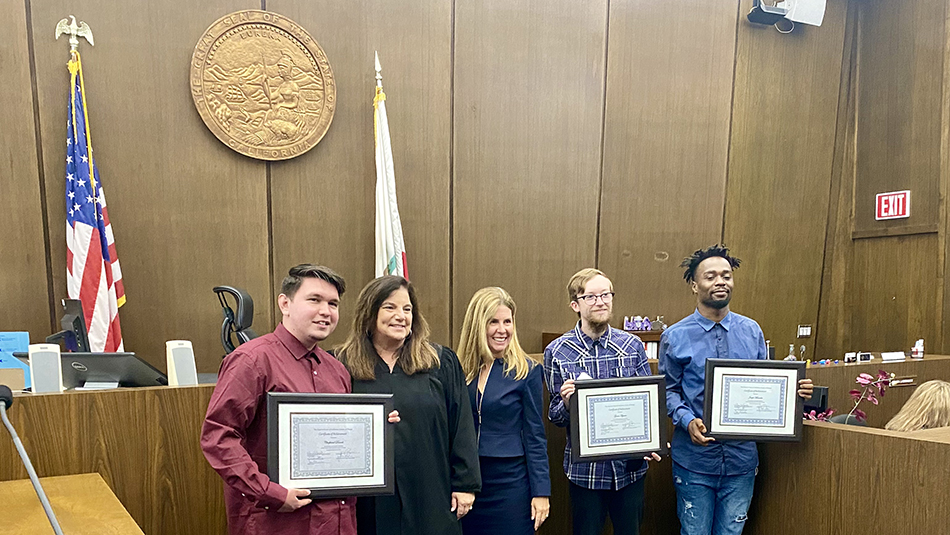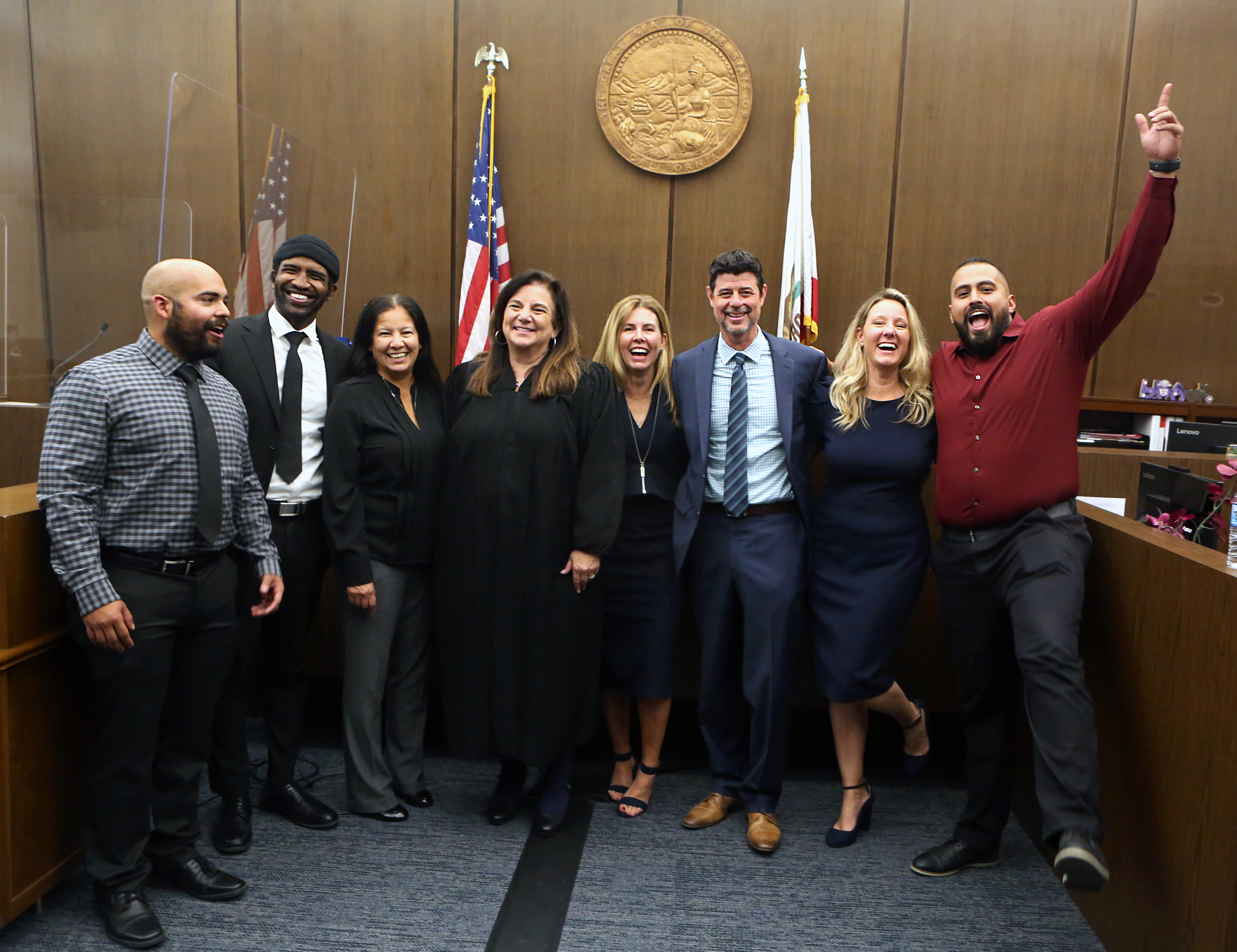
A trio of participants graduating from the Orange County Young Adult Court program in October of 2021 bookend two of the program’s key collaborators, Orange County Superior Court Judge Maria Hernandez, second from left, and Professor Elizabeth Cauffman, center. Photo by Mimi Ko Cruz. YAC is made possible through a collaborative effort between UCI, Orange County Superior Court, Orange County Probation Department, Orange County Public Defender and Defense Bar, Orange County District Attorney’s Office and Orangewood Foundation. Pictured from left (inset photo) are representatives of the team: Jalil Vazquez, Yehudah Pryce, Janet Apocada-Flores, Hernandez, Cauffman, Frank Davis, Terri Bianchi and Francisco Martinez. Photo by Karen Tapia
Funds will provide more extensive wraparound services for participants
The Orange County Health Care Agency (HCA) has awarded the University of California, Irvine a $10.1 million Mental Health Services Act (MHSA) Innovation grant to expand the study of the Orange County Young Adult Court (YAC) pioneered, in part, by Elizabeth Cauffman, professor of psychological science, education and law.
 YAC is a collaborative court for first-time felony offenders between the ages of 18 and 25. Launched in Orange County as a pilot project in August 2018, it is one of few such courts in the country. It was created through the efforts of Cauffman;Orange County Superior Court Judge and UCI alumna Maria Hernandez; Cauffman’s former postdoctoral student Zachary Rowan, assistant professor of criminology at Simon Fraser University in Canada; the Orange County Probation Department; the Orange County Public Defender and Defense Bar; the Orange County District Attorney’s Office; and the Orangewood Foundation.
YAC is a collaborative court for first-time felony offenders between the ages of 18 and 25. Launched in Orange County as a pilot project in August 2018, it is one of few such courts in the country. It was created through the efforts of Cauffman;Orange County Superior Court Judge and UCI alumna Maria Hernandez; Cauffman’s former postdoctoral student Zachary Rowan, assistant professor of criminology at Simon Fraser University in Canada; the Orange County Probation Department; the Orange County Public Defender and Defense Bar; the Orange County District Attorney’s Office; and the Orangewood Foundation.
One of the most consequential incentives of participating in YAC is the reduction of a felony charge to a misdemeanor or the complete dismissal of the felony charge. The program consists of developing a “youth action plan,” which lays out all the steps participants must complete such as attending all court hearings, meeting with probation officers and case managers, getting substance and/or alcohol abuse treatment, mental health counseling, employment and education advice and following through.
To date, YAC has graduated 17 young men, who have had their felonies removed from their records. Cauffman and her research team have been following their progress. The latest grant will allow the research team to continue tracking participants for up to four years after graduation, an extension from the current two-year window. The funding will also expand the program to include up to 300 first-time felony offenders, with half randomly assigned to participate in YAC and half randomly assigned to a control group.
“My mantra is ‘science to the streets,’ ” Cauffman said, explaining that “if we want to see change in the criminal justice system, we need to use science to guide that.”
Cauffman added that the MHSA innovation grant, as well as a $299,538 grant awarded to UCI this month from the Orange County Community Corrections Partnership, approved by the Board of Supervisors, also to support YAC will help the university fulfill this goal and build bridges with policymakers and practitioners in the community.
“Through MHSA, HCA is able to support important innovative projects like YAC,” said Veronica Kelley, HCA Mental Health and Recovery Services chief. “This collaborative project helps our agencies leverage resources while informing treatment and best practices for behavioral health care, leading to improved outcomes in community health and wellness.”
The primary objective is to address and prevent criminal behavior in the future, Cauffman and Judge Hernandez agree.
“Young Adult Court implements the policies that make a difference,” Hernandez said, adding that it aims to break the cycle of recidivism. "We will find out if we do reduce recidivism rates with this program, but we’re going to capture a lot more than that, such as whether participants find stable housing and jobs and whether their mental health improves and substance abuse issues decline.”
Early data indicates that one of the biggest barriers to finding and keeping a job is access to transportation. The new funding will provide program participants with public transportation and car service vouchers, as well as housing assistance, grocery vouchers and mental health counseling, which is a new and crucial intervention. Students from UCI’s clinical psychology Ph.D. program will serve as counselors.
“This is exactly what social justice is about,” Cauffman said. “We need to hold people accountable but in developmentally appropriate ways. This is our opportunity to see if YAC can make that difference.”
The detrimental effects of treating young adult offenders to harsh sanctioning disrupts their human and social capital, which can generate substantial inequalities among young adults exposed to the criminal justice system, Cauffman said.
“The damage associated with official sanctioning and collateral consequences for 18- to 25-year-olds is particularly startling when we consider the fact that these individuals have a significant portion of their lives still ahead of them,” she explained. “This is not only important for the youth, but for our community as a whole. If we want these youth to be productive members of our society, we cannot saddle them with a label that limits their opportunities. If you want your community safe, if you want good outcomes, you need to invest now to make a change in the future.”
YAC has been supported by a number of grants and gifts since it launched four years ago, including $200,000 from philanthropist Gary Fudge and $780,000 from the National Institute of Justice.
Contact:
Mimi Ko Cruz
Director of Communications
949-824-1278
Related:
OC Young Adult Court celebrates 4th graduation